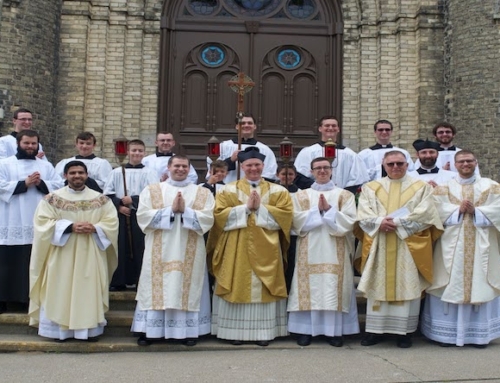No, it’s not 42.
Regardless of whether one gets the reference, it should be obvious that such an absurd answer to the question of life’s meaning was meant as a joke. Yet, the fact that this joke has enjoyed such wide appeal reveals an unhappy state of affairs: most people actually don’t know the meaning of life. Even worse, it seems that more and more people, influenced by pseudo-scientific and pseudo-philosophical ways of thinking, believe either that life has no meaning or that life’s meaning is constructed by each individual person.
But nothing could be farther from the truth.
Admittedly, it is difficult to discover and prove the meaning of life, and even then rarely without some error creeping in along the way. But it is possible, and we see this in the writings of some of the greatest philosophers, Plato and Aristotle for example. Each in their own way, they prove that the end, or meaning, of life is to know God and imitate him as far as humanly possible.
Thankfully, however, one need not be a philosophical genius to know all of this. God, well aware of the frailty of the human mind after Adam’s sin, has chosen to reveal it to us. Furthermore, he reveals not just the natural, human end of life but he also calls and invites each of us to a far greater end, one that surpasses all our natural desires.
It was to reveal this higher meaning of life that he manifested himself to the Patriarchs, bestowed the Law through Moses, and instructed his people through the Prophets. And not content to speak with us only through others, when the fullness of time had come he sent forth his Son, born of a woman, in order to instruct us himself: “I came so that they might have life and have it more abundantly…. Now this is eternal life, that they should know you, the only true God, and the one whom you sent, Jesus Christ” (Jn 10:10; 17:3).
This, then, is the ultimate meaning of life: to know and love God as he knows and loves himself; to know and love God as a friend.
In testimony of this teaching—as an act of mercy for our doubting hearts—Jesus became obedient for us unto death, even death on a cross, for “No one has greater love than this, to lay down one’s life for one’s friends” (Jn 15:13). So the next time someone broaches the topic of life’s meaning, look no further than the cross, upon which the love of Love himself is so wonderfully displayed.
Sing, my tongue, the glorious battle
Sing the last, the dread affray;
O’er the cross, the victor’s trophy,
Sound the high triumphal lay:
Tell how Christ, the world’s Redeemer,
As a victim won the day.
God, his Maker, sorely grieving
That the first-made Adam fell,
When he ate the fruit of sorrow,
Whose reward was death and hell,
Noted then this wood, the ruin
Of the ancient wood to quell.
Wherefore, when the sacred fullness
Of the appointed time was come,
This world’s Maker left his Father,
Sent the heav’nly mansion from,
And proceeded, God Incarnate,
Of the Virgin’s holy womb.
Thirty years among us dwelling,
His appointed time fulfilled,
Born for this, he meets his passion,
For that this he freely willed:
On the cross the Lamb is lifted,
Where his life-blood shall be spilled.
Faithful cross! above all other,
One and only noble tree!
None in foliage, none in blossom,
None in fruit thy peers may be;
Sweetest wood and sweetest iron!
Sweetest weight is hung on thee.
(from “Pange lingua gloriosi” by St. Fortunatus [6th c.], trans. John Mason Neale)
September 14th is the Feast of the Exaltation of the Holy Cross. In the Roman Liturgy, verses from the “Pange lingua gloriosi”are suggested as the hymn for Matins and Lauds. The “Crux fidelis,” the last verse reproduced here, can also be sung for the solemn veneration of the relics of the True Cross.
✠
Image: Photo by Fr. Lawrence Lew, O.P. (used with permission)







